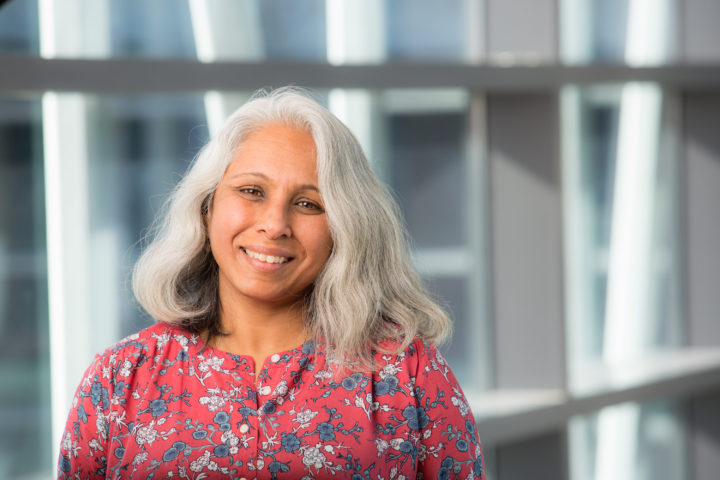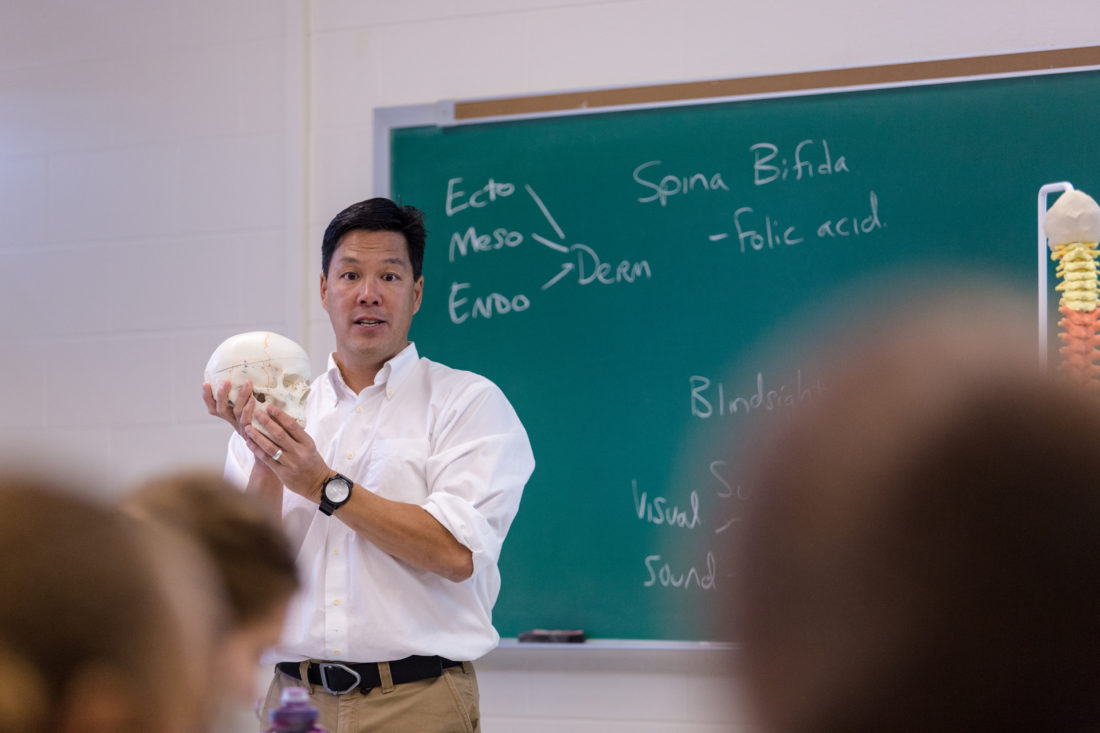In June 2002, renowned neuroscientist Richard Davidson made big waves in both the scientific and Buddhist communities when he was able to objectively demonstrate that long-term meditation practice may have significant impacts on brain structure and function. By attaching the wires of an electroencephalogram device to the heads of Buddhist monks, he was able to measure the brain waves they generated in different states of consciousness.
That pioneering work netted Davidson both the American Psychological Association’s Award for Distinguished Scientific Contributions and UCLA’s Mani Bhaumik Award for advancing the understanding of the brain and conscious mind in healing. A member of the American Academy of Arts and Sciences, he was named one of the 100 most influential people in the world by Time magazine in 2006.
In February, Asheville residents will have a couple of chances to hear Davidson speak. He’ll give a lecture and lead a class at UNC Asheville; both events will be free and open to the public. The lecture, titled “Well-Being is a Skill,” will cover his research concerning the physical impacts of meditation on the human brain. It’s scheduled for Thursday, Feb. 13, in UNCA’s Lipinsky Auditorium. The next day, Davidson will lead a free public master class.
To set the stage for those events, Patrick Foo, an associate professor of psychology, will give a preliminary talk on Tuesday, Feb. 4, in the Highsmith Student Union’s Blue Ridge Room. Foo, the former head of UNCA’s neuroscience department, says his lecture, “The Neuroscience of Meditative Practices,” will present background information about neuroscience and brain function in preparation for Davidson’s lecture. In addition, it will emphasize the many different types of meditation, the idea that meditation is a learnable skill and the objective evidence that meditation can alter human brain function.
“The big breakthrough with Davidson’s studies was on gamma frequency activity,” says Foo. Gamma waves, he explains, are generated when humans experience feelings of epiphany or a sudden realization. “Normal people only exhibit gamma waves for a fraction of a second. Usually it comes with insight, like solving a puzzle. … One thing that has been really striking in these master meditators: They can show this type of gamma frequency for minutes. There’s some evidence they may even be showing [gamma waves] in their sleep.”
Around the year 2000, Foo recalls, “There was an invite from the Society for Neuroscience to bring the Dalai Lama to their international conference, and there was a huge debate. At that time there was not a lot of objective evidence that there were changes in the brain, so there was a bigger scientific debate about if it was wishful thinking or placebo. Thanks to Dr. Davidson and many collaborators, we are starting to see a foundation of something that is objectively there that we can study. That has been a big change, in a great part due to him.”
Campus contemplatives
The upcoming events are aligned with a number of current UNCA course offerings.
“We have a foundational course called The Art and Science of Meditation, but that is an interdisciplinary course, not in our department,” says Ameena Batada, associate professor of health and wellness. “In my courses, we talk about the practical applications and implications of meditation.” What Davidson and Foo will be discussing, on the other hand, “is what’s happening internally and how we’re actually able to change our own traits by engaging in these behaviors long term and consistently.”

Batada and colleagues from a number of departments teamed up recently to design an interdisciplinary program in contemplative inquiry that teaches various techniques for processing and understanding experiences. Students, she says, “complete 12 credit hours toward the certificate.” Some of those courses are more about reflecting on new experiences and how they can be used to promote health and wellness; in others, such as Stress Management and Optimal Performance, meditation and mindfulness are integral parts of the curriculum.
“Mindful awareness doesn’t mean you are meditating,” Batada explains. “Most people think of meditation as some kind of quiet sitting or quiet focus, but mindful awareness could be washing the dishes and just paying attention.”
Throughout her time at UNCA, Batada has taught mindfulness practices as part of her classes. “We have always had at least one course on mental and emotional health, which would include meditation,” she notes. “But our department is increasingly doing work around mind/body interaction, and I think we’re really just one piece of what has been happening around campus. Over the last 8 1/2 years, I have seen a notable difference in how students respond to mindfulness activities in the classroom, to meditation. … It has really been encouraging.”
Thanks to some of those students, there’s now a Mindfulness Club on campus. Another group, notes Batada, “started a co-op housing situation that is founded on a lot of contemplative practice.”
Reaping the benefits
But you don’t have to be a neuroscientist or even a UNCA student to take advantage of what meditation offers, longtime practitioners maintain.
Batada says her practice has helped her learn to regulate her own emotions. “As a course facilitator and instructor, every day you go into the classroom and you never know what’s going to happen. So having the ability to stop and pay attention, and then to ask yourself questions about it, is amazing to be able to do, rather than going off into a tailspin of unproductive thoughts.”
Our minds are too busy, notes Hun Lye, the founder and spiritual director of Urban Dharma NC. “We’re too restless. … If you think you are really restless and can’t focus, that’s what meditation is designed for.” Urban Dharma, a Buddhist temple in downtown Asheville, offers a range of courses and programs, including meditation instruction for beginners.
For Lye, however, the benefits of meditation extend far beyond the physical. Scientists like Davidson, he continues, “have found ways to make Buddhist-based meditation relevant and helpful, so that a whole range of people can manage better. I think that’s great. It’s certainly very interesting, and it helps the greater public to have an interest in meditation.” Lye is quick to add, however, “While helping us to manage and get relief from stress and pain is a good thing, the Buddha taught meditation for those who want to be free from the problem of suffering in a complete and ultimate way.”
As a Buddhist, he explains, “My practice is not reliant on what these studies find or don’t find. What these studies are capable of discovering, proving, by the nature of how such studies are premised and set up — and, therefore, are able or not able to measure — is only one aspect of what the Buddha was offering to the world.”
Foo, meanwhile, emphasizes that even if someone finds it hard to commit to meditation classes or going to a temple, just a little bit of meditative practice can make a big difference in their ability to self-regulate their emotions.
“If it’s something you do like brushing your teeth — just a couple of minutes a day and it helps you deal with the stresses of everyday life — or if it helps you be more compassionate and feel more empathy with others, that is a great thing,” he points out. “You might call it mental hygiene.”
Batada agrees. She’s happy to see people engaging with these practices at any level: “You don’t have to be a sitting Buddha to reap the benefits of meditation.”




Before you comment
The comments section is here to provide a platform for civil dialogue on the issues we face together as a local community. Xpress is committed to offering this platform for all voices, but when the tone of the discussion gets nasty or strays off topic, we believe many people choose not to participate. Xpress editors are determined to moderate comments to ensure a constructive interchange is maintained. All comments judged not to be in keeping with the spirit of civil discourse will be removed and repeat violators will be banned. See here for our terms of service. Thank you for being part of this effort to promote respectful discussion.